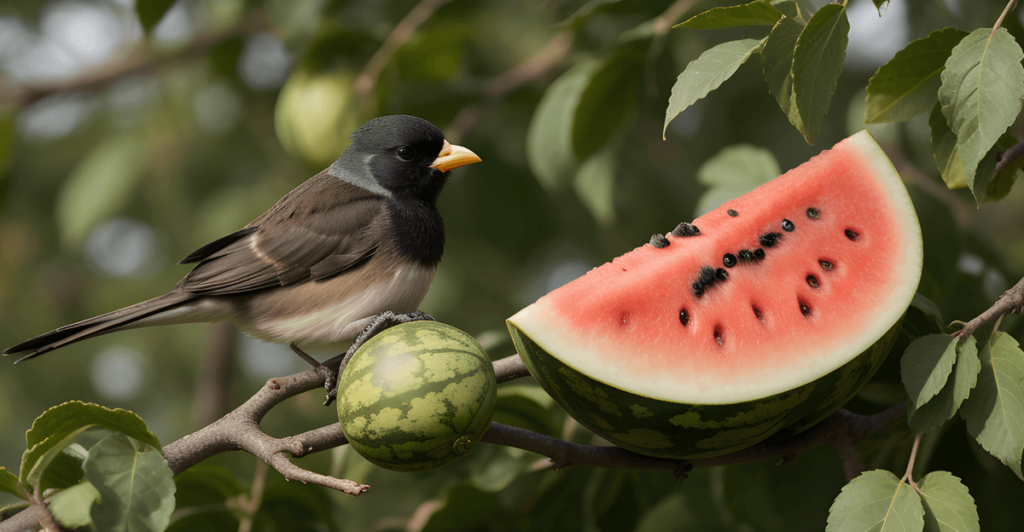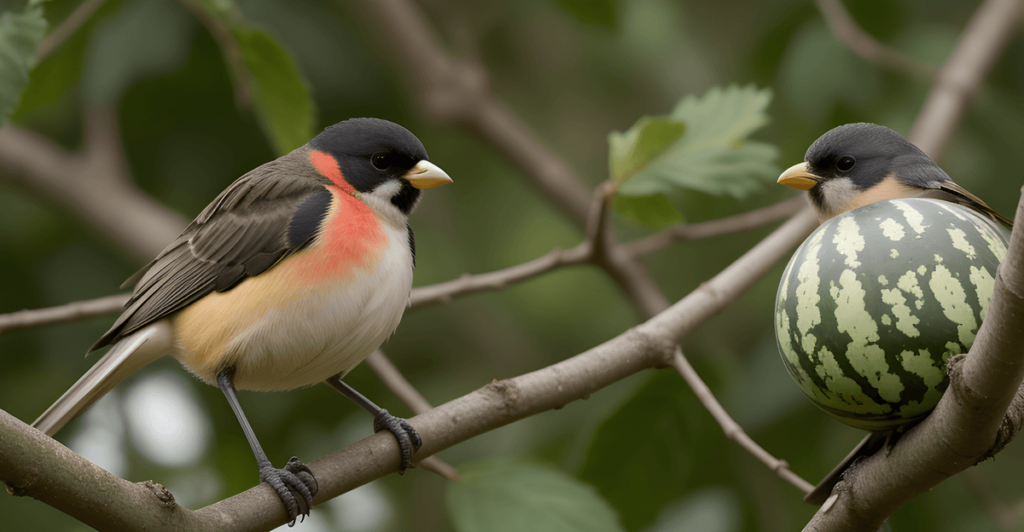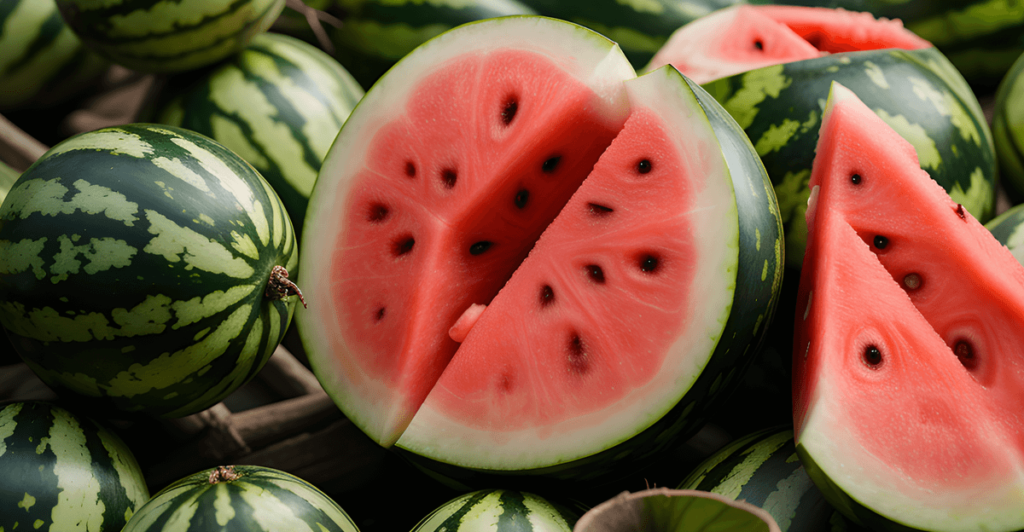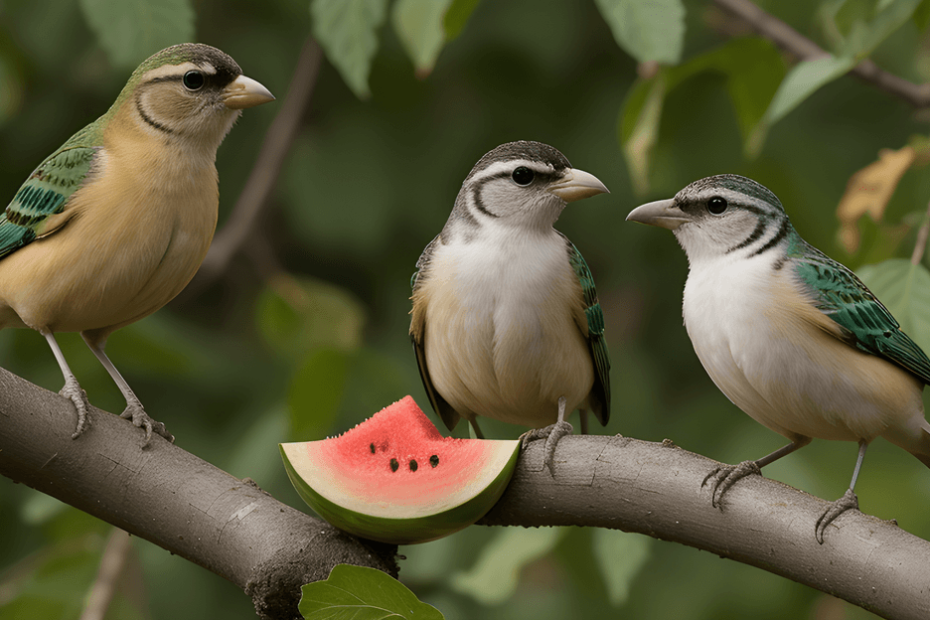Key Takeaways
- Offer watermelon in moderation: Birds generally enjoy watermelon, but it should be given as an occasional treat rather than a staple in their diet.
- Ensure safety: Remove seeds and rind to prevent choking hazards and pesticide exposure when feeding watermelon to birds.
- Consider nutritional benefits: Watermelon can provide hydration and some vitamins to birds, but it should not replace a balanced diet.
- Supervise introduction: Gradually introduce watermelon to bird diets to monitor for any adverse reactions or digestive issues.
- Know bird preferences: Different bird species may have varying preferences for watermelon, so observe their reactions to determine if they enjoy it.
- Explore alternatives: If birds do not like watermelon or have negative reactions, consider offering safe fruits like apples or berries as alternatives.
Introduction
Ever wondered if birds have a penchant for watermelon? Picture this: juicy, vibrant watermelon slices on a hot summer day – do our wild birds enjoy this refreshing treat as much as we do? Join me in uncovering the answer to this fruity question. From chirping sparrows to majestic robins, let’s delve into whether these avian creatures find delight in indulging in nature’s sweet and hydrating gift. So, are you ready to explore the intriguing relationship between birds and watermelon?
Do Birds Like Watermelon?
Attraction to Sweet Taste
Birds, including parrots, are often drawn to the sweet taste of watermelon. The high sugar content in this fruit can be appealing to wild birds and parrots. When offered, parrots may show a keen interest in consuming watermelon due to its natural sweetness.
Some birds find the juicy texture of watermelon enjoyable. The succulent nature of this fruit can provide a refreshing and hydrating experience for birds, especially during hot weather. Parrots’ thirst can be effectively quenched by the watery consistency of watermelon.
Wild birds exhibit a clear preference for watermelon over other fruits when given the choice. For example, robins and cardinals might favor watermelon pieces compared to other available fruits like berries or apples.
Nutritional Benefits
Watermelons offer more than just taste; they also provide essential nutrients beneficial for birds’ health, including parrots. This fruit contains vital minerals such as potassium which is crucial for maintaining proper bodily functions in birds, including parrots.
Offering small pieces of watermelon can be an excellent way to introduce hydration into a bird’s diet without causing any digestive issues, especially for parrots since it has plenty of moisture content. Moreover, consuming watermelons in moderation can contribute positively towards boosting energy levels in birds due to their natural sugars.
When providing treats like watermelons to parrots, it’s essential not only as part of their diet but also as a source of mental stimulation and enrichment for our feathered friends.
Safety of Feeding Watermelon to Birds
Feeding Watermelon to Birds
Birds, including parrots, enjoy watermelon, and it is generally safe for them when given in moderation. Safety should always be a priority when feeding birds, so make sure to remove the seeds and rind before offering parrots this treat. By doing this, you can prevent any potential hazards that these parts of the fruit may pose to the parrots.
Watermelon is a hydrating and nutritious snack for parrots during hot weather. As with any new food introduced into their diet, it’s essential to monitor the parrots after they consume watermelon. This way, you can observe if there are any adverse reactions or digestive issues that may arise from eating this fruit. Providing a balanced diet including fruits like watermelon can contribute positively to their overall health.
Moderation is Key
Offering watermelon as an occasional treat rather than a staple part of their diet ensures that birds get variety while avoiding overconsumption of certain foods. While some species might devour large quantities of watermelon without issue, others could experience stomach upset if they eat too much at once. Balancing their intake helps maintain their well-being.
- Pros:
- Hydrating snack for birds
- Nutritious addition to their diet
- Cons:
- Overconsumption may lead to stomach upset
- Seeds and rind can pose choking hazards
Personal Experience with Feeding Birds Watermelon
I have noticed that smaller bird species tend to enjoy pecking at small pieces of watermelon more than larger ones like crows or pigeons do. It’s fascinating how different bird species have varying preferences even within the same type of food! When I offer watermelons as treats during hotter days, I see increased bird activity near my feeders.

Nutritional Value of Watermelon for Birds
Hydration Benefits
Watermelon is a great source of hydration for birds due to its nutritional benefits and high water content. This juicy fruit helps keep our feathered friends hydrated, especially during hot weather or dry climates. Birds enjoy the refreshing taste of watermelon while reaping the benefits of staying hydrated.
Birds like parrots, canaries, and finches find watermelon particularly appealing because it provides essential nutrients in a hydrating form. The succulent nature of this fruit makes it an enticing treat that also supports their overall health by keeping them hydrated throughout the day.
Vitamins A and C
Watermelon contains important nutrients such as vitamins A and C which are crucial for maintaining bird health. These essential nutrients play a vital role in supporting their immune system, promoting healthy growth, and enhancing their overall well-being. By incorporating watermelon into their diet, birds can benefit from these key vitamins that contribute to their vitality.
For example, vitamin C aids in boosting birds’ immune systems, helping them fight off illnesses more effectively. Vitamin A supports optimal vision and skin health in birds. Including watermelon in their diet ensures they receive these beneficial nutrients naturally without any artificial additives or supplements.
Low Calorie Content
One significant advantage of feeding watermelon to birds is its low calorie content which can be suitable for some bird diets. For pet owners looking to provide a healthy yet tasty snack for their avian companions without worrying about excessive calories, offering small portions of watermelon can be an excellent choice.
While enjoying the sweetness of this fruit as a treat now and then won’t harm most bird species when given in moderation due to its low calorie content compared to other fruits with higher sugar levels like grapes or bananas.
Benefits of Feeding Watermelon to Birds
Refreshing Treat
Birds enjoy watermelon as a refreshing treat, especially during hot weather. The high water content in this fruit helps birds stay hydrated and cool. Offering watermelon can be a delightful way to help our feathered friends beat the heat.
Watermelon is not only hydrating but also provides essential nutrients for birds. It contains vitamins A and C, which are beneficial for their overall health. The natural sugars in watermelon offer a quick source of energy for active birds.
Diet Enrichment
Feeding watermelon to birds can enrich their diet by adding variety and flavor. Including different foods like watermelon ensures that pet birds receive a balanced nutrition plan. Mixing up their meals keeps them interested and engaged with their food choices.
I’ve noticed that my pet bird loves pecking at pieces of chilled watermelon on warm days; it’s heartwarming to see how much joy this simple treat brings him. By offering occasional slices of fresh watermelon, I feel like I’m providing him with both nourishment and entertainment.
Antioxidant Benefits
Watermelons contain antioxidants such as lycopene, which can be advantageous for some bird species’ health. These antioxidants help protect cells from damage caused by free radicals, promoting overall well-being in birds.
- Pros:
- Hydrating snack for birds in hot weather.
- Provides essential vitamins like A and C.
- Adds variety to the diet of pet birds.
- Cons:
- Excessive consumption may lead to digestive issues.
Introducing Watermelon to Bird Diets
Introducing Watermelon
Birds can enjoy watermelon as part of a balanced diet. To introduce watermelon to birds, start by offering small amounts mixed with other fruits or seeds. This method helps in encouraging consumption and observing their reaction before making it a regular part of their diet.
Watermelons have high water content, aiding in hydration for birds. Mixing watermelon with other fruits or seeds ensures that birds receive the necessary nutrients while enjoying the treat. By gradually incorporating this fruit into their diet, you reduce the risk of digestive issues due to sudden dietary changes.
Personal Experience: I found that mixing diced watermelon with sunflower seeds attracted various bird species to my backyard feeder. Observing them enjoy this refreshing snack was both entertaining and fulfilling.

Monitoring Bird Reactions
Observing how birds react to watermelon is crucial before increasing its quantity in their diet. While some birds may immediately take a liking to this fruit, others might be more hesitant. Pay attention to any signs of digestive issues after consuming watermelon.
Pros:
- High water content aids in hydration.
- Mixing with other foods encourages consumption.
Cons:
- Large amounts can lead to digestive problems.
- Some birds may not like it initially but could develop a taste over time.
Bird Species That Enjoy Watermelon
Popular Choices
Bird species, such as parrots, doves, and finches, are known to relish the taste of watermelon. These birds enjoy pecking at the juicy flesh of watermelons, savoring its sweetness. For instance, parrots often delight in picking out the seeds from a slice of watermelon before consuming it.
I have observed that some bird enthusiasts provide small chunks of watermelon to their pet parrots as an occasional treat. The vibrant colors and refreshing taste seem to captivate these birds, making it a delightful snack for them.
Hummingbird Attraction
Hummingbirds might also be drawn to watermelon due to its sugary content. The sweet juice of watermelon can serve as a natural source of energy for these tiny creatures. Observing hummingbirds hovering around pieces of ripe watermelon could be quite fascinating.
In my experience, I have noticed that different bird species exhibit unique behaviors when presented with watermelons. While some may eagerly devour the fruit within minutes, others might take their time exploring it cautiously before indulging in the treat.
Precautions When Feeding Watermelon to Birds
Spoiled or Fermented Watermelon
When feeding watermelon to birds, it’s crucial to ensure that the fruit is fresh and not spoiled or fermented. Spoiled watermelon can make birds sick due to harmful bacteria growth. Moldy or fermented watermelons should be discarded immediately as they can cause digestive issues in birds.
It’s essential to check the condition of the watermelon before offering it to birds. Signs of spoilage include a sour smell, mushy texture, and mold growth on the rind. By inspecting the watermelon carefully, you can prevent potential health risks for the birds enjoying this treat.
Limiting Quantity
While many bird species enjoy eating watermelon, moderation is key when introducing this fruit into their diet. Excessive consumption of watermelon can lead to digestive problems in birds due to its high sugar content. Limiting the amount of watermelon offered ensures that birds receive a balanced diet without overindulging in sugary treats.
Birds should have access to a varied diet that includes fruits, vegetables, seeds, and grains. Watermelons can be given as an occasional treat rather than a primary food source for optimal avian health. Balancing their intake with other nutritious foods helps maintain their overall well-being.

Choking Hazard from Seeds
When serving watermelons to birds, it’s important to remove or crush large seeds that could pose a choking hazard for certain bird species. Some smaller bird varieties may struggle with larger seeds and could accidentally ingest them whole while eating slices of watermelon.
To avoid any potential choking incidents, consider offering seedless varieties of watermelons or removing all visible seeds before providing the fruit as a snack for your feathered friends.
Alternative Fruits for Birds
Popular Fruit Choices
Apples, berries, and bananas are great sources of nutrition for many bird species. These fruits provide essential vitamins and minerals necessary for their well-being. For example, apples offer fiber, while berries are rich in antioxidants that support birds’ health.
I often see wild birds enjoying a feast of oranges and grapes in my backyard. Oranges are packed with vitamin C, offering an energy boost to our feathered friends. Grapes not only provide hydration but also contain various nutrients crucial for the overall health of birds. Offering these fruits can attract a diverse range of backyard birds to your garden.
Balanced Diet
To ensure a balanced diet for pet birds, it’s essential to offer them a mix of fruits regularly. By providing different types of fruits like apples, berries, bananas, oranges, and grapes in rotation, you guarantee that they receive a variety of nutrients such as amino acids and minerals vital for their growth and development.
Personally speaking from experience caring for backyard birds over the years, I have found that incorporating various fruits into their diet keeps them healthy and happy. Observing how different bird species react to the assortment of fruit offerings has been both educational and entertaining.
Consulting a Vet Before Feeding Watermelon to Birds
Consulting a Vet
Before feeding watermelon to birds, it is crucial to consult with an avian veterinarian. Avian experts can provide valuable insights into whether watermelon is suitable for specific bird species. Seeking professional advice ensures that pet birds receive the necessary vitamins and nutrients without compromising their health.
Avian veterinarians play a vital role in guiding bird owners on incorporating new foods like watermelon into their pets’ diets. They can offer tailored recommendations based on the individual needs and dietary requirements of each bird. By consulting with a vet, you can prevent potential health issues and ensure that your feathered friend stays healthy and happy.
Ensuring Bird Health
When considering introducing watermelon as an occasional treat for your pet bird, it’s essential to be mindful of the amount given. While watermelon contains beneficial vitamins, excessive consumption may lead to health problems in birds. Avian veterinarians emphasize the importance of moderation when offering treats like watermelon to prevent any adverse effects on your feathered companion’s well-being.
Birds have delicate digestive systems, making it crucial to monitor their diet carefully. Introducing new foods gradually allows birds’ bodies time to adjust and reduces the risk of digestive upset or other complications. Always observe your bird’s behavior after feeding them watermelon; if you notice any signs of discomfort or unusual behavior, consult with your avian vet promptly.
Personal Insights:
I remember consulting my avian veterinarian before giving my parrot new treats like fruits such as grapes or apples; this ensured I provided him with a balanced diet while keeping him healthy and happy at the same time.
Closing Thoughts
After diving into the world of birds and watermelon, it’s clear that many feathered friends enjoy this juicy treat. From the safety considerations to the nutritional benefits and the precautions to keep in mind, feeding watermelon to birds can be a rewarding experience for both parties involved. Remember, consulting a vet before making any dietary changes for your bird buddies is always a wise move.
So, if you’re thinking about adding some watermelon to your bird’s menu, go for it! Just ensure you’re doing it safely and in moderation. Your avian pals might just thank you with a chirp of approval! Happy bird watching and treat giving!
Frequently Asked Questions
Do birds really like watermelon?
Yes, many bird species enjoy watermelon due to its juicy and sweet nature. It can be a refreshing treat for them especially during hot weather.
Is it safe to feed watermelon to birds?
Feeding small amounts of seedless watermelon to birds is generally safe. Just ensure the fruit is fresh and cut into appropriate sizes for the bird’s consumption.
What nutritional benefits does watermelon offer to birds?
Watermelon provides hydration, vitamins A and C, as well as antioxidants that can benefit a bird’s overall health when consumed in moderation.
Are there any precautions I should take when feeding watermelon to birds?
Avoid feeding birds large quantities of watermelon or any part with seeds. Always wash the fruit thoroughly before offering it to your feathered friends.
Can I give other fruits besides watermelon to my pet bird?
Yes, you can provide a variety of fruits like apples, berries, and oranges but always research which fruits are safe for specific bird species before offering them.
